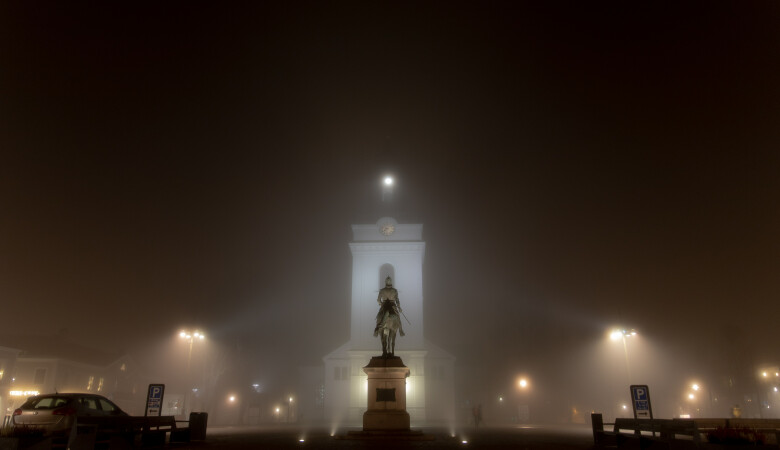Our Greatest Danger and Our Only Salvation: The Righteousness of God (Romans Sermon 5 of 120)
February 06, 2000 | Andy Davis
Romans 1:16-17
Imputed Righteousness, Righteousness of God
I. The Gospel is the Power of God for Salvation
Good morning. Why don't you open your Bibles to Romans 1:16-17. Two weeks ago, we had a select group of people that, I think, walked here or came by dog sled and we looked at Romans 1:16. Today, what I would like to do is try to explain some of what we said that day, but I want to concentrate on Romans 1:17. "I am not ashamed of the gospel because it is the power of God for the salvation of everyone who believes, first for the Jew, then for the Gentile. For in the gospel, the righteousness of God is revealed a righteousness that is by faith from first to last, just as it is written, the righteous will live by faith."
After I graduated from college, I took a trip across the country with a friend of mine and we came to Yosemite National Park, spectacular place, and it's a favorite place for rock climbers. Now I would never involve myself in that kind of activity, especially after talking to one rock climber in particular who was a self-called free soloist. Now, I don't know if you know what free solo rock climbing is, but it involves climbing up rocks that sometimes might take two full days to get up to the top with no equipment at all. No ropes, nothing, just your hands and your feet, and your strength, and your skill. And if it takes two full days to climb up, you can imagine, after a couple of hours, you're high enough so that if you slip, no one will ever talk to you again. It's a very dangerous thing to do.
And I thought to myself, "How foolish can that be? How foolish to risk your life for that kind of fun or entertainment, to risk your life for it?" But he claimed that he was good at what he did, he had a great deal of skill at it. And I would imagine so since I was talking to him and he was talking back, he was still alive. So apparently he had enough skill to survive one or two of those trips anyway. But is his foolhardiness any greater than that of somebody who walks around without the righteousness of God? Somebody who walks around apart from Jesus Christ? I would submit that that is far greater foolhardiness, and it's my goal today to explain that to you. I want you to understand the connection between Romans 1:16 and Romans 1:17. Just that simple, it's the only verses we're looking at today. I want you to understand the righteousness of God in verse 17.
Now last time, we talked about the gospel. Now the gospel provides an occasion for shaming. Paul says, "I'm not ashamed of the gospel." And the reason it does is that the gospel brings out a shaming reaction in the people who hear it and don't want to hear its message. It makes you feel guilty. There's conviction, sin is discussed, judgement and the righteousness of God... And so, as a defense mechanism, an unbeliever is going to create a shaming opportunity and try to make you feel ashamed. We talked about that. But Paul says, "My freedom from shame comes from the gospel itself. I'm not ashamed of the Gospel because of the nature of the message I'm bringing. This is a glorious message, it's a great message I love this gospel message because it's the power of God for the salvation of the people who are trying to put me to shame. And so I'm not ashamed. As a matter of fact, just like Jesus Christ, I look beyond the shame to the goal, I look beyond the shame to what's on the other side."
Jesus, in Hebrews 12, it says, "For the joy set before Him endured the cross, despising the shame, and sat down at the right hand of God." "Despising" there, in Hebrews 12, means He thought little of it. It meant nothing to Him, the shame meant nothing to Him. And what shame it was to be beaten and mocked and rejected by His people, and walk through the streets, and nailed to the cross. There was a tremendous opportunity to feel ashamed, but Christ did not feel ashamed. He despised the shame, thought little of it because there was something on the other side. It was worth it to Him to pay the price, worth it to Him. And that's the way it was for Paul, he said, "I'm not ashamed. It doesn't matter if I'm beaten in the city square and dragged into the center of the jail to spend the night. It doesn't matter, I'm not ashamed. I love this gospel message. " So we discuss that.
But the center of verse 16 is that the gospel is the power of God for the salvation of everyone who believes. And I ask, does salvation take power? Is there a power necessary for salvation? Well, there is if you understand it properly. According to Ephesians 2, all of us, apart from Christ, are dead in our transgressions and sins. Now you see the need for power. Who among us can raise ourselves from the dead? We need the supernatural power of God to raise us up, and the gospel is that power. It's power for spiritual resurrection and even more. He says, "It is the power of God for the salvation of those who believe." I did not say justification. Oh, that's part of it, yes, that's the beginning of the journey, complete forgiveness of all of your sins. What a blessed thought is that? How many are there? Do you really know how many sins you've committed in your life? You don't have the first idea. You do not know the measure of your salvation. You don't know how much God has forgiven or how much, when all is said and done, he will have forgiven you. But it's all forgiven, cleansed, if you believe this message.
Power of God, for justification? No, for the whole journey, because it's the power of God also to take you from that first moment of faith when you're justified and move you along in that journey of sanctification, growing daily in holiness, moment by moment more like Jesus. It's a whole journey. It's not just the beginning. And it's the gospel that takes you there. It is powerful. It's not going to leave you the way it found you. It's transforming you. It's changing. It's the power of God for salvation. For everyone who believes, not just for the Jew, but also for the Gentile, for everybody. Let me discuss first for the Jew, then for the Gentile, and there is a certain order there, but ultimately, all of us are justified the same way by faith in Jesus Christ, Jew and Gentile. That's Romans 1:16. You got the sermon from two weeks ago in three minutes.
Now some of you wonder why I can't do that every week, three minutes... But there is value to taking time, and I want to take time now in verse 17, because Paul explains in verse 17 what he meant in verse 16, why he is not ashamed and why the gospel is the power of God for salvation. He begins in verse 17 with the word "for" or "because." I'm not ashamed of the gospel because, in the gospel, the righteousness from God is revealed, the righteousness that is by faith or from faith to faith, just as it is written, and the righteous will live by faith. And so we have to ask our question. We talked about this earlier, but we have to understand it. verse 16 talks about power for salvation, the question is salvation from what? Salvation from what?
II. Our Greatest Problem: The Righteousness of God
Now we use a strong word like "salvation," we're talking about a great danger, aren't we? You don't use salvation for anything but a danger, and there is a great danger. Now what is the danger? And what I'm contending to you is that, interestingly enough, in one verse, we have contained both our greatest danger and our only hope, in one phrase, "The righteousness of God." It is both our greatest danger and our only hope. I'm going to explain that.
One thing that I like, John Piper took this verse and rearranged it, and I like what he does. He's trying to explain to us here, in Romans 1:16-17, something we tend to miss when we think of the gospel. And he does it in an interesting way, clever way. He says, "What I'm going to do is I'm going to translate it wrongly. Actually it's not even a translation, I'm just going to put in a different word than Paul uses to try to underscore something that we need underscored." And his mistranslation reads like this, "I am not ashamed of the gospel because it is the power of God for the salvation of everyone who believes, first for the Jew, then for the Gentile, for in the gospel the 'love' of God is revealed." The love of God is revealed. Is that what Paul says? No, it's not. Now, is the love of God revealed in the gospel? Oh, yes. I contend there's no greater demonstration of the love of God than in the gospel. Romans 5:8, "But God demonstrates or displays His own love for us in this, while we were still sinners Christ died for us." You want to measure of the love of God, look at the cross, look at the cross. But Paul is not talking about love here, is he? And here's the point, we tend to think of the love of God wrongly, as though, in effect, God is saying, "I'm a loving God. I'm a kind God. I feel kind toward you, I want you to be with me, come and live with me forever in heaven." Is that the gospel message? Absolutely not. Absolutely not. Does the love of God take all our unrighteousness, all our sin, and sweep it under the rug, and pretend it's not there? Is that what the gospel does? No, it does not. And therefore, this verse does not talk about the love of God. It talks about the righteousness, the righteousness of God.
If it were like that, that God just says, "I'm a kind God. I'm a good God. I love you, come and be with me," this would have been a very short book. I don't just mean Romans, I mean the whole Bible. It'd be very short. Especially in Romans, you wouldn't need 16 chapters, and we certainly could skip the gruesome story of the death of the Son of God. Skip it. Wouldn't even have happened. God would just welcome all of us into heaven, everyone of us, because He's a loving God, a kind God. But there's a problem, isn't there? And the problem is the righteousness of God. He can't do that. He won't do it, because He is righteous.
The Righteousness of God / The Holiness of God
Now, when we are talking about the righteousness of God, there's another way to say it. We're talking about the holiness of God, His love for what is right, that righteousness is the scepter, the foundation of His throne, the holiness of God. And this is one of the major central things in the Bible, isn't it? God has to communicate to us His holiness. Does God ever tell us that He is love? Does He ever say, "God is love?" Yes, He does. Yes, He does. But He also says that He's holy. And He doesn't actually just say that He's holy, actually He says that He's holy, holy, holy. Now, is He any more holy than He is love? No. But we need to hear the "holy" three times because of who we are. We've got to hear it. We need to understand what it means.
"In the year that King Uzziah died, I saw the Lord seated on a throne, high and exalted, and the train of his robe filled the temple. Above him were seraphs, each with six wings: With two wings they covered their faces, with two they covered their feet, and with two they were flying. And they were calling to one another: ‘Holy, holy, holy is the Lord Almighty; the whole earth is full of his glory.’ At the sound of their voices the doorposts and thresholds shook and the temple was filled with smoke." And what did Isaiah say? "Woe is me." "Woe is me. I'm ruined! For I'm a man of unclean lips and I live among a people of unclean lips, and my eyes have seen the King, the Lord Almighty." Do you think that Isaiah was thinking about the love of God at that point? I think he was thinking about the holiness, the purity, the righteousness of God.
Now don't misunderstand me, the love and the holiness are not arguing with each other. Oh, no. They come together beautifully in the gospel. There's no conflict in God that He is righteous and He is holy. Now what is holiness? Holiness is separation. God is separate from His creation. He's utterly unlike His creation. There's nothing in His creation that you can use to compare to Him. He said that in Isaiah, He said, "What are you going to use to compare to me? What image will you make that looks like me?" Nothing. Separate and above. But that's not the holiness I have in mind. The separation here is separation from evil, separation from sin. He says in Habakkuk 1:13, "Your eyes are too pure to look on evil; you cannot tolerate wrong." He can't even look at evil, then how in the world is He going to let us into heaven? And if you're not sure what "us" we're talking about, we'll get to it the rest of Romans 1. You'll find yourself there. That's the "us" that He's going to let into heaven. Sinful, unrighteous, unholy, filled with all kinds of evil and greed, those are the people that get into heaven. Now my questions is, "How? How do they get there?" Romans 1:17 answers the question, it answers. And so the bottom line is we depend, don't we, we absolutely depend on God's hatred of evil. You may not even know it, but you do. Suppose God didn't hate evil, suppose He loved evil, what kind of world would this be? I can't even describe it to you. What kind of demonic place we would live in? Totally devoid of anything good. But our God hates evil, and we depend on it. We're glad that He hates evil.
But the fact that God hates evil ends up threatening us eternally. Do you realize that? It threatens us. Because we don't think of ourselves properly, but if God hates evil, and if we're unrighteous, His hatred of evil threatens us eternally. There's a threat involved here. Now, we'll get to understand that more fully as we go through the rest of Romans 1. But Romans 1,2 and 3 unfolds the ungodliness that we're talking about. Romans 1:18 says, "The wrath of God is being revealed from heaven against all the godlessness and wickedness of men who suppress the truth by their wickedness," or unrighteousness.
And then Romans 3:10, "There is no one righteous, not even one." Do you find yourself there, in Romans 3:10? Do you see yourself there? "There is no one righteous, not even one?" "Well, except me though, Lord. I'm the one exception to Romans 3:10." No, you're not. There is no one righteous. Not the preacher, not the hearer. There is no one righteous, not even one. All right? But what does that mean? Well, according to the gospel that we're preaching here, it means that we're in trouble. It means that we're threatened, we're under wrath, we're under judgement. It's a dangerous situation. Romans 2:8, just look there "For those who are self-seeking, who reject the truth and follow evil, there will be wrath and anger." That's a promise, that's a gospel promise. All right?
How about Romans 2:5? "But because of your stubbornness and your unrepentant heart, you are storing up wrath against yourself for the day of God's wrath, when his righteous judgment will be revealed." There is a day coming. Romans 2:5 calls it "the day of God's wrath." It is the day when all accounts will be settled properly, everything done justly. God's kindness, tolerance and patience will end. It's over. It's the day of judgment. And that will be a day of trouble, distress, wrath and anger for everyone who is ungodly. It says in John 3:36, "Whoever believes in the Son has eternal life, but whoever rejects the Son will not see life, for God's wrath remains on him."
We're already there. We're already under the wrath of God. It's not like we're going to come into the wrath of God, we're already under the wrath of God. Already there. It's not a journey we make, we're there. We need to come out from under the wrath of God, we're already there. John 3:18, Jesus himself said this, Jesus himself. We should have no more authority than Paul saying it, but I'm saying it anyway. Jesus said this, He said, "Whoever does not believe in the Son stands condemned already." Already condemned. You're already under the wrath of God if you don't believe. Jesus gave us warning after warning about this. Matthew 10:28, "Do not be afraid of those who kill the body but cannot kill the soul. Rather be afraid of the one who can destroy both soul and body in hell." Be afraid of Him.
Now, 21st Century Americans, and that's what we are, 21st Century Americans grossly underestimate judgment day. Grossly underestimate it. Christians and non-Christians alike, I'm only beginning to understand all the things that will happen that day. But I have preached the gospel before, and I have said this to somebody. I have explained to them the righteousness of God, I've explained to them the judgment to come, I've explained to them the forgiveness of sins available through faith in Christ, and they say, "I don't want to hear all that. I'm going to take my chances on judgment day." Now, I've set two images before you so far today, that of the free soloist rock climber and that of the man who says, "I'm going to take my chances on judgment day." Which of those two is more foolish? Do not be afraid of the one who can kill the body and after that can do nothing to you. Be afraid of the one who can destroy both soul and body in hell. Free soloist slips and falls, he dies physically. Okay? But the other person who takes his chances on judgment day and has no interest in Jesus Christ, they fall eternally, eternally.
III. Our Only Salvation: The Revealed Righteousness of God
Martin Luther’s Salvation
And so what I'm saying to you is simply this: Our greatest danger is the righteousness of God. Do you see it? Do you understand it? Our greatest danger is the righteousness of God. But the good news of the gospel is that our greatest hope, in fact, our only hope is the righteousness of God, in verse 17 of Romans Chapter 1. Isn't that incredible? The righteousness of God actually saves you in this verse. Now how in the world can that be? How can the righteousness, which was your greatest danger, suddenly become your only hope? Romans 1:17 explains it. This is exactly why the gospel was good news. Let's go back about 500 years. We've talked about Martin Luther before, but let's talk about him, because Martin Luther got saved on Romans 1:17. I prayed this morning openly that somebody here at First Baptist would also get saved on Romans 1:17.
Can I ask the believers in the room to be praying silently that that would happen? Pray right now, that someone here would be saved by hearing and understanding the same message that saved Martin Luther 500 years ago, the righteousness of God. Pray with me. Pray silently in your heart, all you believers. But this is what happened to Martin Luther, struggling, wrestling, wrestling with his sinfulness, a sense of the judgment of God, the sentence against him, in his heart that he was under the wrath of God. And was he? Yes, he was. He wasn't wrong, but he was wrestling through his own good works. He was trying by his fasting, and by his prayer, and by going to Johann Staupitz who was his father confessor, confessing sin after sin until Staupitz didn't want to see him anymore. He said, "Bring something real to me. I don't want any more of these little sins. Bring the big ones."
He was tired of seeing Luther. Luther had an overactive conscience, but he could not escape the sense of the judgment of God, and this is what he writes. This is his testimony. He says, "I greatly longed to understand Paul's Epistle to the Romans and nothing stood in the way but this one expression, the justice of God. It's the same thing, the righteousness of God, because I took it to mean that justice, whereby God is just and deals justly in punishing the unjust." He said, "I looked at it as judgment day justice, and I saw no hope for myself. I couldn't escape. There was no way out," said Martin Luther. "My situation was, that although an impeccable monk, I stood before God as a sinner troubled in conscience, and I had no confidence that my merit would take away my guilts." I am glad he had no confidence. He said, "I can't get rid of it. And therefore," listen to this, "I did not love a just and angry God, but rather hated and murmured against him."
He actually said to Staupitz, "I hate God," because he couldn't escape. He found no way out. Staupitz was scandalized, stunned, and didn't know what to say. "I hate God," he said. "And yet, I clung to that dear Paul because I thought that there was something in these verses for me, something here that would save me. I didn't know what. I clung to the dear Paul, and I had a great yearning to know what he meant by the statement. Night and day I pondered until at last, I saw the connection between the justice of God and the statement the just shall live by his faith." It's the end of verse 17, "The just shall live by his faith." "Then I grasped that the justice of God is that righteousness, by which through grace and sheer mercy, God justifies us through faith. Thereupon, I felt myself to be reborn and to have gone through open doors into paradise, the whole of scripture took on a new meaning. And whereas before the justice of God had filled me with hate, now it became to me inexpressibly sweet in greater love. This one passage of Paul became for me the gate to heaven."
Isn't that incredible? Now what did he discover? He discovered that the very righteousness that God will require of every one of you and me, the very righteousness he requires on judgment day, he will give us as a free gift, if we receive it by faith. Do you see it? That's the gateway, this justice, this righteousness of God saves you. You put it on like a robe. It covers you. And it will cover you successfully on judgment day. It's incredible. I've just spoken the gospel to you. If you believe, you'll be covered with it, covered with it, just like Luther was.
Augustine’s Struggle
Saint Augustine made the same discovery hundreds of years before that. Remember Augustine, he was enslaved by passion, and lust, could not escape sexual immorality, couldn't get away from it. He knew he was under the judgment of God, he knew he was unrighteous, he could not break the power of sin in his life. And he made a startling discovery. God commands sexual purity, Romans 13:14, but in the command came something he had noticed, too. "Not in orgies and drunkenness, not in sexual immorality and debauchery, not in dissension and jealousy, rather clothe yourselves with the Lord Jesus Christ. What does that mean? "Clothe yourselves with the Lord Jesus Christ." And this is what he wrote in his confessions. Great passage. Speaking directly, confessions. It's like one long prayer. He's just speaking to God, talking to God about his own conversion. This is his story, but he's speaking it to God.
And this is what Augustine said to God, "And my only hope, my whole hope is only in your exceeding great mercy." Can all of you say that, by the way, "My only hope is in your exceeding great mercy?" If you can't, you're trusting your own righteousness. Don't cling to it, it will do you no good on judgement day. This is what Augustine said, "My only hope is in your exceeding great mercy." Now listen to this, "Give what you command and command whatever you will. You impose sexual purity on us, nevertheless when I perceived said someone that I could not otherwise obtain her except that God gave her to me, that was a point of wisdom also, to know whose gift she was." Sexual purity was going to be given to me as a gift by God. He commanded it, and then He's going to give it as a gift. "Oh, charity, my God, kindle me. You command sexual purity, give what you command, and command what you will."
Do you understand that? God commands all kinds of things, doesn't he? More than you can count. Go through the Bible, 66 books, and count the commands from God. There's more than 10, lots more than 10. What did Augustine discover? Give what you command and command what you will. Righteousness of God comes as a gift. Here's a command from God, command right from the mouth of our Lord, "Be perfect therefore as your Heavenly Father is perfect." "Be perfect therefore as your Heavenly Father is perfect." Now, how are you going to work that one out? What labor, what struggle are you going to do to accomplish that command. "Give what you command, Lord, and command what you will." He will give you perfection in the gospel.
Imputed Righteousness – Three Images
That's what Romans 1:17 is all about. How does the gospel save believers? Romans 1:17 tells us, it's by imputed righteousness. Uh-oh, now we're into theology. This is serious. When we get into big words like imputed righteousness, it means it's given to you as a gift, that's all. The righteousness that God requires on judgment day, He simply gives you as a gift by faith. Now what is this righteousness? There's different possibilities. Could be the righteousness of God whereby He displays himself to be righteous and letting sinners like us into heaven by having Jesus die in the cross in our place. Do you see that? He's got to display His righteousness. That's Romans 3, we'll get to that. Or it could be the righteousness, whereby your sins are forgiven and you don't stand under the judgment of God, the righteousness of justification. Or it could be that righteousness that comes to you as you walk by faith and grow, and grow until at last you're glorified and become exactly like Jesus righteously speaking. Actually, the Gospel covers all of that. The righteousness of God is the whole thing. The whole thing is given to you as a gift by faith.
Now, when we think about the righteousness of God, it's a moral quality or attribute of God, God is perfect, holy in all His ways. God is light and in Him there is, what, no darkness at all. Do you know that if you're a believer in Jesus Christ, someday that will be true of you? No darkness at all. None. Aren't you waiting for that day? Oh, I'm hungry for it. I want it. I want to be free from all darkness, within and without, too. All right? So, the righteous person, it says, is going to live by what? "The righteous will live by faith." But wait, wait, wait. I already quoted Romans 3:10, "There is no one righteous, not even one." And yet here's this righteous person in Romans 1:17. How do they get to be righteous? The righteousness of God comes. God makes them righteous and then they live by faith. It's the gospel.
Now, I'm going to give you one clear verse that teaches this and three images from scripture, so you can hold on to this, so you can understand it. One clear verse, write this one down, it's probably in there, but I didn't put out the text. 2 Corinthians 5:21, you got to look it up. "God made Him, [Christ] who had no sin to be sin for us, so that in Him we might become the righteousness of God." It's the same righteousness of God. God made Christ who had no sin to be sin for us, so that in Him we might become the righteousness of God. When did God make Christ sin for us? On the cross, on the cross, he took our sin. He didn't commit any sin Himself, no, morally pure, perfect. But God took our sin and put it on Jesus, and He extinguished the wrath of God when He died under the judgment of God for us, in our place. God made Him who had no sin to be sin for us so that in Him we might become, what? Righteousness of God. There's an exchange. He takes your sin, your filth, your wickedness, your unrighteousness, 70, 80, 90 years of it, takes it all unto Himself. And what does He give you as an exchange? His own holiness, His own righteousness. That's the gospel.
All right, that's one clear verse. What are the pictures? First one, Zechariah Chapter 3, just listen to these verses, Zechariah 3:1-5, "Then he showed me Joshua the high priest standing before the angel of the Lord, and Satan standing at his right side to accuse him. The Lord said to Satan, "The Lord rebuke you, Satan! The Lord, who has chosen Jerusalem, rebuke you! Is not this man a burning stick snatched from the fire?'" "I saved him. You stop rebuking or you stop accusing." So God rebuked Satan, and then it says this, "Joshua was dressed in filthy clothes as he stood before the angel. The angel said to those who were standing before him, 'Take off those filthy clothes.' Then he said to Joshua, 'See, I've taken away your sin and I will put rich garments on you.'" Isn’t that beautiful? "I will clothe you richly, I'll put rich garments on you." "Then I said, 'Put a clean turban on his head.' So they put a clean turban on his head, and they clothe him while the angel of the Lord stood by." Those are sweet verses. It's a picture of judgment day, Satan there to accuse. And God shuts Satan up, shuts the accusation, takes the filth off, puts the rich robe on, picture number one.
Picture number two, there was once a father who had two sons. One of the sons said, "Give me my share of the inheritance." And what does he do? Goes off and squanders it in loose living. You remember the story, "Prodigal Son." Now, what happened to the prodigal son? Well, he found himself at a very low point. You remember that? Very low point. There was a famine in the land, he couldn't get food, he couldn't do anything. And so he found himself feeding pigs, and he longed to feed himself on the food he was giving to the pigs. That is low. And that is what sin will do to you. You may already feel that, to some degree. You may see it, perhaps, in your life. Maybe not, but that's what sin does. It brings you very far from your father's house. And then suddenly, he came to himself and he said, "It's better in my father's house. I'm going to go and repent, and I'm going to ask not that I be a son but that I just be a servant in my father's house." And so he began and started on his way.
I'm going to read, "But while he was still a long way off, his father saw him and was filled with compassion for him. And he ran to his son, and he threw his arms around him." What clothes do you think the son was wearing at that moment? Oh, my goodness. The clothes of a pig feeder. They must have stunk. And the father threw his arms around the son, and the son said to him, "'Father, I have sinned against heaven, against you. I'm no longer worthy to be called your son.' But the father said to the servants, 'Quick! Bring the best robe and put it on him. Put a ring on his finger, sandals on his feet.'" That's image number two.
Third image, another parable of Jesus, Matthew 22. There was a king who wanted to throw a wedding banquet for his son, and he went out and told those people who were invited to the banquet to come, but they said, "I'm too busy. I've got economic responsibilities. I'm not going to come to your banquet." And he was shocked, and well should he be shocked. That was going to be a great party. You don't want to miss it. It's going to be a great banquet, a great feast. Don't miss it. And so he said, "All right. Then go out in all the streets and gather everybody you can find. Just fill the place." But when the king came in to see the guests, he noticed a man there who was not wearing wedding clothes. "'Friend," he asked, 'how did you get in here without wedding clothes?' The man was speechless. And the king told the attendants, 'Tie him hand and foot, and throw him outside into the darkness where there will be weeping and gnashing of teeth, for many are called but few are chosen.'"
Now, I didn't make that parable up. I'm just explaining it to you. I think that that is talking about the righteousness of God. And if you're not clothed with it on judgment day, what is going to happen to you? "Tie him hand and foot and throw him outside in the darkness where there'll be weeping and gnashing of teeth." You need the righteousness of God on judgment day or you will not survive. You will not survive that day without the righteousness of God. I have given you one clear verse. Second Corinthians 5:21, I've given you three clear pictures. Zechariah 3, the high priest covered in filthy robes and God says, "Put a clean robe on him." Remember? And the prodigal son covered with pig stuff, covered with mess, and the father says, "Clothe him with the best, best robe." And the third picture, the wedding banquet in which someone didn't have the proper clothes and he's thrown outside.
IV. From faith to faith
Verse 17 of Romans 1 says that this righteousness is a revealed righteousness. "For in the gospel the righteousness from God is being revealed." the Greek tense is that it's continually presently being revealed. You know how it's being revealed? By people like me explaining it, preaching it, that's how it's being revealed. You start to understand. You can't see this righteousness in the rising sun. You can learn other things about God when the sun comes up, but you can't see the righteousness of God that way. You have to have it revealed to you by the preaching of the gospel. In the gospel, the righteousness of God is revealed. Whenever the gospel is preached, the righteousness of God starts coming up in your mind and you start being hungry for it, you want it, you want to be clothed with God's righteousness, you know that your filthy rags will never do you on judgment day, and you would love an exchange. Oh, if you could just have an exchange. It's available. It's available simply by faith.
Verse 17, it says, "In the gospel the righteousness from God is being revealed, the righteousness from faith to faith." This righteousness from God comes simply by faith, just believing. Faith. Romans 3:21-22, "But now righteousness from God, apart from law, has been made known to which the law and the prophets testify. This righteousness comes through faith in Jesus Christ to everyone who believes. There is no difference, for all have sinned and lacked the glory of God." There's no difference. You all get it by faith in Jesus Christ alone. It says the same thing in Philippians 3:9, talks about this, he says, "That I may gain Christ and be found in Him, not having a righteousness of my own which comes from the law, but a righteousness which is through faith in Christ, a righteousness that comes from God and is by faith." Do you see the consistent lesson? It's a gift of righteousness. It comes by faith alone.
Now, listen, if the righteousness comes from God as a gift to the helpless, and if the helpless must have faith to receive it, then faith is part of the gift. Do you understand that? Faith is part of the gift. Ephesians 2:8-9, "For by grace are you saved through faith, and this not from yourselves." It is what? It's a gift of God. The faith that saves is a strong, powerful, enduring thing. It will survive anything. It cannot be extinguished by anything because it's from God. It's strong, it's powerful, and it saves. It comes through hearing the message, "Faith comes from hearing," Romans 10:17, but it's coming as a gift from God and it's strong.
V. The Righteous Will Live by Faith
And this message is for believers, too. I asked you earlier to pray, you believers, for someone who is not yet a believer, didn't I? Now pray for yourselves, because the Bible says that it's from faith to faith. In other words, step by step. By hearing this message, you grow in righteousness. By hearing this message, you grow up in your salvation. So pray for yourselves now, that you may have the faith to take the next step in your Christian life wherever you are. By faith, growing in holiness, more and more like Jesus. It says in Verse 17, "As it is written, the righteous will live by faith." Step by step, you're going to live by faith. Then pray for yourselves, "God give me faith. Strengthen my faith." And you know what he'll say? "Hear the word. Hear it again. Hear it again. Saturate your life, and your faith will grow and so will the holiness in your life. Hear this book. Hear this word. Understand and you'll grow."
Ongoing faith is required. Not starting faith, but not finishing faith. The whole thing, a faith that is strong enough to survive the whole thing. It's a gift from God. First Corinthians 15:1-2, He says "Now, brothers, I want to remind you of the gospel I preached to you, which you have received and on which you have taken your stand. By this gospel you are saved, if you hold firmly to the word I preach to you. Otherwise, you have believed in vain." Oh, there's a vain belief. Oh, yes, of course, there's a vain belief. It's a counterfeit belief. But the faith that God gives, it's not counterfeit. It will survive and endure every trial, every temptation. And it says, "The righteous will live by faith."
In Habakkuk's day... That was a quote from Habakkuk. In Habakkuk's day, the threat was judgment from God by an army. An army was going to come and break down Jerusalem's walls. The army was going to come and torch Jerusalem's homes. The army was going to kill and loot and plunder. But the righteous would survive that day by faith. So will you survive that coming day, coming day of judgement, coming day of wrath? By faith in Jesus, you will stand on that day. You will survive, and you will be clothed with righteousness. It's a righteousness that doesn't belong to you. It's Jesus's. He bought it with His own blood, and He wants to give it to you. Put it on. Despair in your own righteousness. Turn your back on your own good deeds. Stop saying, "I'm basically a good person." Turn away from all of that which will drag you to hell. Put on the robe of righteousness which will take you to heaven. It's a gift, a free gift, from Jesus Christ.
VI. Review and Application
We've seen that our greatest problem, our greatest danger, is the righteousness of God. We've seen also that our only solution is the righteousness of God. I just want to ask you, will you believe? Will you believe? I have some other applications, read them, take them home, enjoy them. That's why I give you these little slips, but I want to step aside from that, and I want to speak directly to you. Some day, maybe in some of your cases very soon, you're going to be laying in a hospital bed and the doctor is going to come in with a certain look on his face. It's not the look you were hoping for. Your test results are in. And actually, at that moment, you've decided you really don't want to hear what he has to say, so you just simply ask, "How long? How long do I have?" And he says, "I don't know. A week, a month, I don't know. It's not good." And when he walks out of the room, you'll put your head back on your pillow, and what will you cling to then? Very soon you will see the God that I've described, holy, pure and righteous. What are you going to cling to then?
Now, I may be your pastor, and I may come and try to explain some things to you. Listen now. Listen now. It's coming sooner than you think. Cling to the righteousness from God, which he offers by faith in Jesus Christ alone. Will you pray with me?






























